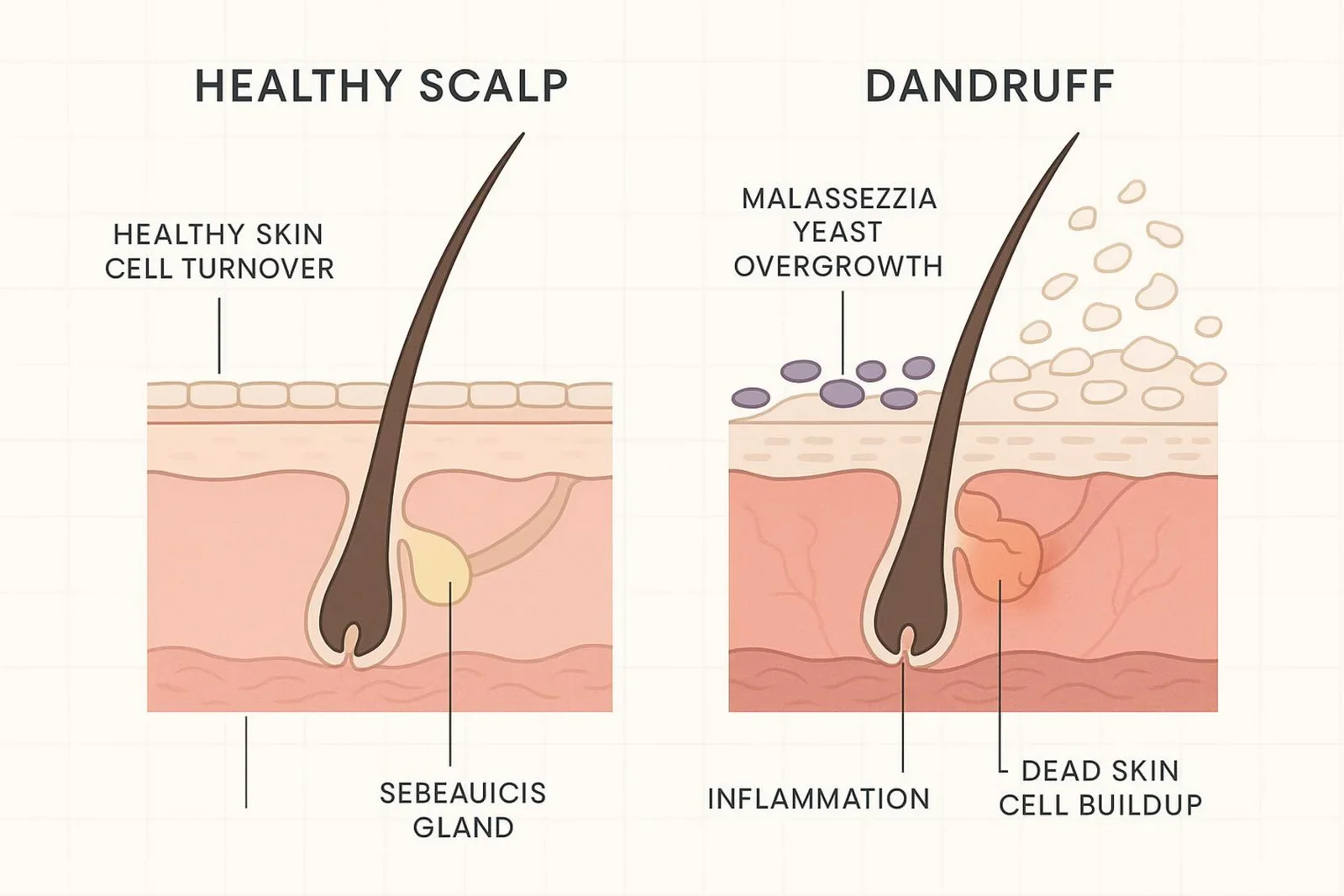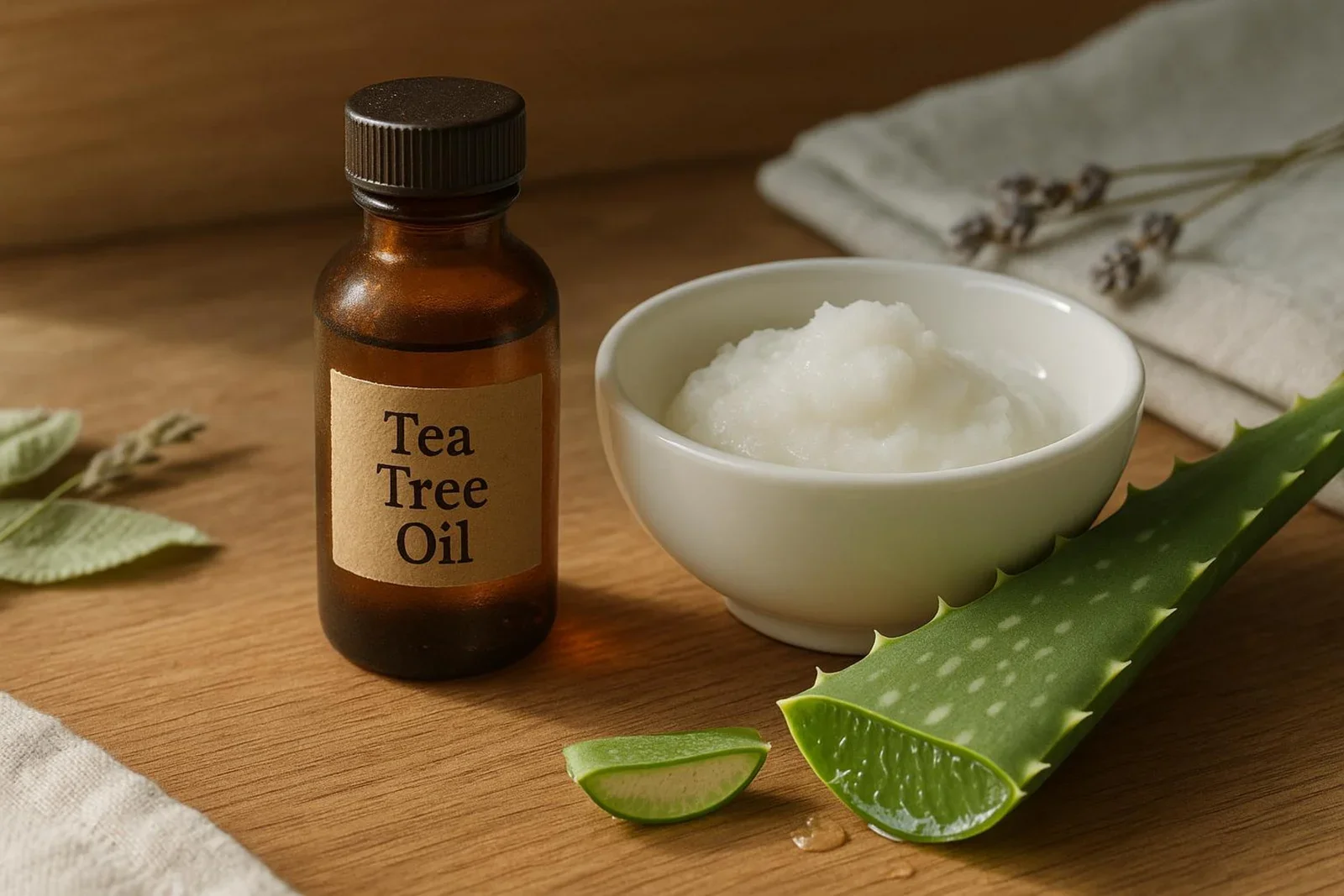How to Prevent Dandruff
Dandruff is the appearance of white or yellow flakes on your scalp, hair, or even on your shoulders. It's a common problem, with about half of people worldwide experiencing it at some point. While dandruff isn't harmful or contagious, it can be embarrassing. The positive news is that, for most, preventing and controlling dandruff is possible with a few simple habits and the correct products. The main idea is to know what causes dandruff and then take action to target those causes.
Basically, dandruff happens when your scalp sheds dead skin cells too quickly. Usually, this process happens so quietly that you don't see it. But when the scalp is unbalanced, dead cells can mix with scalp oils and form visible flakes. This unbalance can be caused by several things, such as a common scalp yeast named Malassezia, or by having a very dry or oily scalp. The trick to preventing dandruff is to restore balance and avoid flaking.
Which Habits and Lifestyle Changes Can Help Prevent Dandruff?
Besides using the right shampoos, daily habits and lifestyle choices are important for keeping dandruff under control. A healthy scalp relies on what you do each day, how you handle stress, and even what foods you eat.
How Often Should You Wash Your Hair and What Shampoo Should You Use?
Washing your hair the right amount is key. Not washing enough leads to oil and skin cell build-up, causing flakes and itchiness. Washing too much can remove your scalp’s natural oils, causing dryness and irritation, which can also lead to dandruff. Try to find a washing routine that keeps your scalp clean but not overly dry or oily. For those with straight or fine hair, daily washing can help control oils, while those with curly or coiled hair may need to wash less often. When washing, gently massage your scalp and let anti-dandruff shampoos sit for a few minutes for the best results.
Scalp Care Tips
Besides washing, regular scalp care can help. Brush your hair gently (especially when it’s damp, not wet) twice a day to spread natural oils and avoid build-up of dead skin cells. Don’t brush too hard, as that can make your scalp worse. Protect your scalp from the sun with a hat, and try not to use hot styling tools too much, as heat can dry your scalp. If you’re outside often, make sure your hat isn’t too tight, as that can cause friction and discomfort.
Healthy Diet for Your Scalp
While the connection between diet and dandruff isn't totally clear, eating well might help. Some studies suggest that certain foods can cause skin flare-ups or make inflammation worse. Try to eat less refined carbs, gluten, red meat, ultra-processed, fried, or sugary foods. Focus on a balanced diet with enough nutrients, especially omega-3 fatty acids for maintaining skin moisture and fighting inflammation. Probiotics, which are good bacteria, may also help your immune defenses and might keep dandruff-causing fungi under control.
How to Manage Stress and Triggers
Stress affects your body in many ways, including your scalp. While stress doesn’t directly cause dandruff, it can make it worse by weakening your immune system, letting scalp yeast grow more easily. Try managing stress with deep breathing, regular exercise, or fun hobbies. Keeping track of when your dandruff gets worse might help you spot and avoid personal triggers. Environmental factors like cold, dry air can also make dandruff worse, so using a humidifier at home during winter can help.
What Are the Best Products and Ingredients for Dandruff Prevention?
To stop dandruff, especially if it doesn’t go away, certain products and their key ingredients can really help. Knowing which to pick makes a big difference.
What to Look for in Anti-Dandruff Shampoos
If regular shampoo isn’t enough, try an anti-dandruff shampoo. These have special ingredients that fight dandruff at its source. You don’t need a prescription, and you can get them at most stores. Read the label, as the ingredients do different things. Choose a product based on your scalp type-dry scalps usually have small white flakes, while oily scalps have larger yellowish flakes. Sensitive scalps may show redness and more itching. Some brands make shampoos for these specific needs.
Main Active Ingredients in Shampoos
| Ingredient | Main Purpose |
|---|---|
| Zinc Pyrithione | Slows down fungus growth and is also used for psoriasis, eczema, and acne. |
| Ketoconazole | Antifungal, controls Malassezia yeast; found in stronger medicated shampoos. |
| Selenium Sulfide | Controls scalp fungus and slows cell turnover. |
| Coal Tar | Slows down skin cell growth and shedding. May discolor light hair and make scalp sensitive to sun. |
| Salicylic Acid | Helps remove dead skin and flakes; often mixed with other ingredients. |
Apply these shampoos to your scalp and massage them in. Leave them on for several minutes before rinsing. If a shampoo doesn’t help after a few weeks, try another with a different main ingredient, since different people respond to different ones.
Should You Mix Anti-Dandruff and Ordinary Shampoos?
While treating dandruff, stick with your anti-dandruff shampoo, especially during the first phase of treatment. Ordinary shampoos may lessen the effect or irritate your scalp. People with dandruff tend to have more sensitive scalps, so using extra products can cause more irritation. After you control dandruff, you might be able to use other shampoos sometimes, or rotate between different anti-dandruff shampoos. Always follow product instructions, and ask a doctor if you aren’t sure.
Natural and Home Remedies That Might Help Prevent Dandruff
If you want to try natural solutions or extra treatments at home, there are some options. While not all have strong scientific proof, many people use them for mild cases or together with other prevention steps.
Popular Home Remedies
Tea Tree Oil: Known for its antimicrobial and antifungal qualities, it may help if fungus is causing your dandruff. Dilute with a gentle carrier oil before applying to avoid irritation.
Coconut Oil: May improve scalp moisture and reduce inflammation. Rub a few teaspoons into your scalp, leave for an hour, then shampoo.
Aloe Vera: Known for soothing the skin and possibly fighting fungi. Apply fresh aloe vera gel to your scalp before washing your hair.
More Remedies: Apple Cider Vinegar and Baking Soda
Apple Cider Vinegar: Some believe it helps rebalance scalp pH and limit fungal growth. Mix equal parts vinegar and water, apply to your scalp, wait 15 minutes to an hour, then rinse.
Baking Soda: May act as a gentle scrub and limit itching. Rub a small amount onto your wet scalp, leave for a few minutes, then rinse.
Are Probiotics, Omega-3s, or Other Herbal Choices Useful?
Omega-3s: Essential for skin moisture and to reduce irritation. These are found in fish, flaxseeds, and walnuts or as supplements.
Probiotics: Support your immune system and may limit the fungi that cause dandruff.
Other Herbs: Some people try herbs besides tea tree oil, but research is limited, and you should test them carefully for reactions.
When Should You See a Doctor?
Many can manage dandruff with store-bought shampoos and lifestyle changes. But sometimes, you need to see a professional, especially if symptoms don’t go away or are very bad.
Signs That Mean You Should Get Help
Itching is so bad it affects daily life or sleep
Redness, swelling, or pain on your scalp
Bleeding or open sores from scratching
Discoloration or rash spreading to other areas
Unusually large, thick flakes
Hair loss along with flaking
Dandruff can look like other scalps problems, like seborrheic dermatitis, psoriasis, eczema, or ringworm. A doctor can figure out which one you have.
When to Visit a GP or Skin Specialist
If you see these severe symptoms or over-the-counter products don't help after a few weeks, schedule a visit with your GP. Bring a list of symptoms and products you’ve used. If needed, your doctor may send you to a dermatologist, who can check more closely and prescribe stronger shampoos or creams.
Questions People Ask About Dandruff Prevention
Can Dandruff Be Stopped for Good?
For most people, dandruff is a long-term issue that you can control but not completely fix. The factors that lead to dandruff (like Malassezia yeast and how your scalp reacts) are often ongoing. With a good routine, you can manage dandruff and have long breaks between flare-ups. A long-term plan with anti-dandruff shampoo helps-just use less often if your scalp stays clear. If it keeps coming back, talk to your doctor or pharmacist about what to do next.
Does Dandruff Lead to Hair Loss?
Normally, dandruff does not directly cause hair loss. It’s mostly about flaking and itching, not making hair fall out. However, scratching a lot can damage the skin and sometimes cause hair thinning or breakage. If strong hair loss comes with flaking, see a doctor since this could be a sign of another scalp issue needing treatment.
How Long Until Dandruff Improves?
Don’t expect to see results right away. With regular use of anti-dandruff shampoo, you should notice improvement in about 2 to 3 weeks (or 5 to 10 washes). Start by using the shampoo three times a week for four weeks, then use it less often for upkeep. If things don’t get better after a few weeks, try a shampoo with another main ingredient or ask a healthcare provider for advice, as you might need a different approach or have another issue.
Do you live in Sydney?
Get the perfect look at our salon – schedule your appointment now!
Our Services
Check Out Our Instagram
Check out our instagram
Check out our instagram and see our latest posts!
Check out our facebook
Check out our facebook and see our latest
posts!










